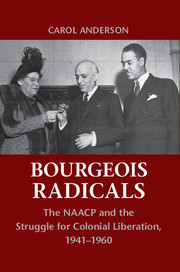Book contents
- Frontmatter
- Dedication
- Contents
- List of Figures
- Acknowledgments
- Introduction De-Centering Du Bois
- 1 Rising Wind
- 2 “The White Man’s Burden Has Not Been Very Heavy”
- 3 “An Even Larger Issue Than ‘Containing Communism’”
- 4 So Weak, So Seventeenth Century
- 5 Regime Change
- Conclusion Beyond the Single Story
- Bibliography
- Index
- References
Conclusion - Beyond the Single Story
Published online by Cambridge University Press: 05 December 2014
- Frontmatter
- Dedication
- Contents
- List of Figures
- Acknowledgments
- Introduction De-Centering Du Bois
- 1 Rising Wind
- 2 “The White Man’s Burden Has Not Been Very Heavy”
- 3 “An Even Larger Issue Than ‘Containing Communism’”
- 4 So Weak, So Seventeenth Century
- 5 Regime Change
- Conclusion Beyond the Single Story
- Bibliography
- Index
- References
Summary
The NAACP is the nation’s oldest, largest, baddest, boldest, most hated, most debated, most notorious, and most victorious civil rights organization.
– Benjamin Todd JealousThe NAACP was determined to fight for a freedom that was more robust, inclusive, and real than the U.S. government or the colonial powers were ever willing to support. When Churchill said that the Atlantic Charter did not apply to the British Empire, he meant it. When he insisted that “America and Europe ... will ... keep Negro Africa in its place,” the prime minister more than meant it.
When Southern Democrats blocked the UN’s development of human rights in a self-serving effort to protect Jim Crow, they certainly meant it. When Truman and powerful members of the press defined economic development as welfare for the Hottentots, they surely meant it. When Daniel Malan roared that he would not have the “festering sore” of racial equality anywhere near his South Africa, he definitely meant it. When Carlo Sforza and Paul Reynaud compared the entrenched Italian and French settlers in their respective colonies to whites in South Africa, they so meant it. And, when the Dutch made clear that they were willing to fight to the last man in the Indian Army and the last red cent of the Marshall Plan to control Indonesia, they meant every word.
- Type
- Chapter
- Information
- Bourgeois RadicalsThe NAACP and the Struggle for Colonial Liberation, 1941–1960, pp. 330 - 336Publisher: Cambridge University PressPrint publication year: 2014



